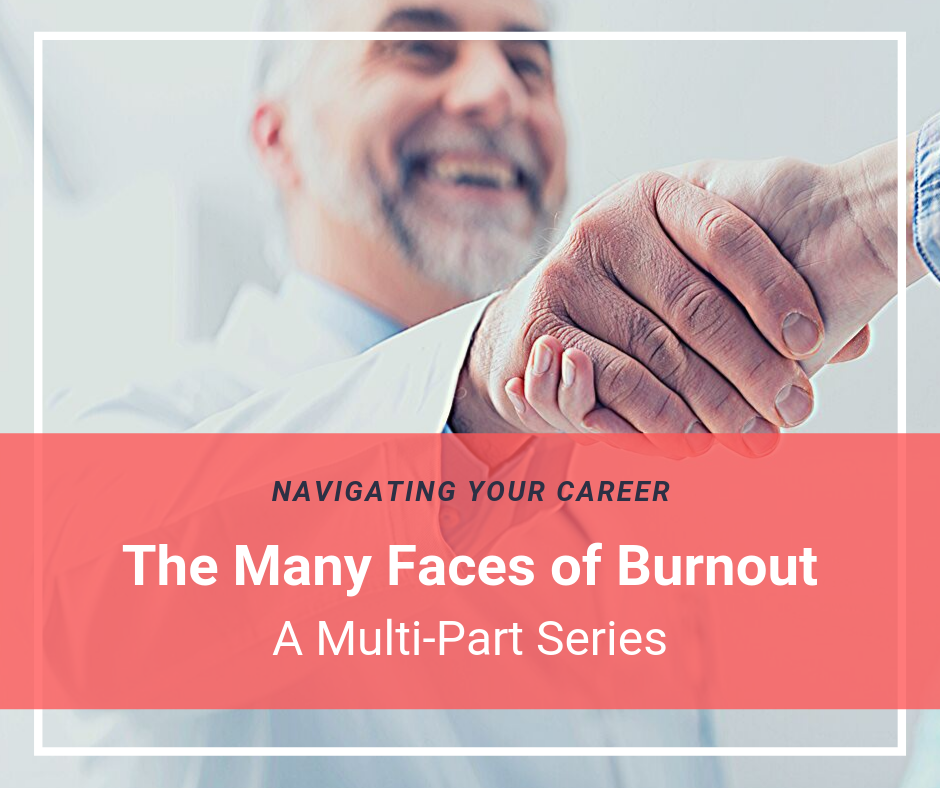Burnout can take many shapes and forms, and often times, identifying the risk factors leading up to it can be tricky. This series will explore the many faces of burnout by offering different perspectives from a panel of experts who presented at the AAD 2019 Annual Meeting in Washington DC. We kicked off the series last week with Dr. Elizabeth (Lisa) Swanson’s advice on how to treat and prevent burnout. But what if instead of fighting burnout we strive to maintain our professional fulfillment throughout our career? Dr. Andrea Murina, Associate Professor of Dermatology and Associate Program Director at Tulane University School of Medicine in New Orleans, shares how we can think of professional fulfillment as the opposite of burnout.
Defining Burnout
Physician burnout is not new. It may seem like this is a relatively new epidemic, but doctors are the ones that helped define burnout in 1974. Burnout was defined by a psychologist, Herbert Freudenberger, when observing healthcare workers at a New York clinic. Freudenberger noticed emotional exhaustion, loss of motivation, and depersonalization. Sound familiar? Hopefully, you’re not at this point in your career. Practicing medicine is a privilege and we make an impact on patients’ lives every day. But there are a lot of things in medicine that will try to steal your joy. The way to combat this is to actively work on maintaining your professional fulfillment throughout your career. You can think of professional fulfillment as the opposite of burnout. It is the combination of your job satisfaction, your engagement in your work and your value-driven goals.
Finding Professional Fulfillment
Think about a tough day you’ve had in residency, such as a case of a severe drug reaction. You have to do extra work and check on the patient multiple times, but you do it anyway. The patient is thankful that you were able to diagnose this early and you see the impact of your management. Even if you’re exhausted, you are still glad at the end of the day that you put forth the effort. But what happens if you have days when you feel like you have done your best, but your patient is frustrated and leaves a critical review online, will you still feel the same fulfillment?
We derive our professional fulfillment from our personal well-being, our culture and the efficacy of our practice. Our personal well-being encompasses our mental and physical health as well as our sense of meaning or purpose. Extrinsic rewards (such as financial compensation) can contribute to our fulfillment, but they have been shown to be less motivating when it comes to engagement in our work. The culture and the efficacy of our practice encompass the external environment in which we work. Regulatory burdens, expansion of non-physician providers and the commoditization of our procedures are changing our culture and our professional fulfillment. What can we do?
We must promote our own fulfillment through our work as dermatologists and what we do every day. This means we have to have a sense of our specialty and promote engagement within our specialty. How do we serve the public? What are our special skills? What makes our dermatology teams great? How do we improve our work culture? If we work as a specialty to advocate for our patients and our practices, we can address some of the threats to our profession.
Take a minute and think about something (outside of your clinical work) that you can contribute to the specialty of dermatology. If you like advocacy, you can join your state dermatologic society and learn how to advocate for truth in advertising laws, limiting scope of practice and minimizing regulatory burdens. If you like to volunteer, you can look for opportunities locally, nationally or internationally to serve. If you live near a dermatology residency program, you can offer to lecture to residents or teach/mentor medical students.
Most important, think about ways to promote our specialty to the public and to the house of medicine. We are experts in dermatology. There are no other dermatology “providers” with the 12-16,000+ hours of patient care that we experience during our training. We need to educate the public about the meaning and impact of our expertise. We need to fight the expansion of scope of practice laws and support the delivery of dermatology care by physician-lead teams. Maintaining expertise involves continuing our life-long learning and practice improvement. It is important to carve out time to attend meetings, learn new skills, and network with your peers.
As a dermatologist, the only person that will hold you accountable for maintaining your professional fulfillment is you. Our bosses, office managers and professional organizations aren’t responsible for making us happy and engaged in our work. Complaining about our workload and burnout can seem therapeutic but do very little to impact change.
Achieving and maintaining fulfillment is harder and more challenging than we think. It requires hard work and planning both now and throughout our careers to create a better future for ourselves and our patients.
Dermatology is an amazing specialty that brings professional fulfillment to so many of us. The start of your career is great opportunity to think about ways that you will find joy (and less burnout) in the days, weeks, and years to come.
The Many Faces of Burnout – Living the Dream
The Many Faces of Burnout – Burning out from One-Star Reviews, the new battleground
The Many Faces of Burnout – Back to Basics: How to Regain Joy in Practicing Dermatology

